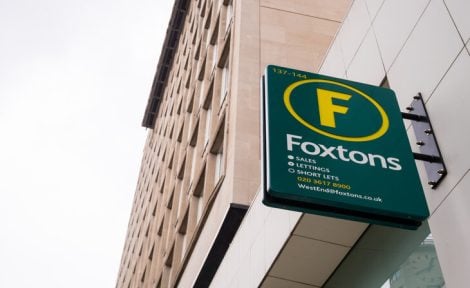Foxtons’ lettings strategy keeps agents on their toes and Group on target
In a third quarter trading update to the City Foxtons reported lettings revenue was up 8% to £31.6 million and up 18% year-to-date to £81.3 million.

Foxton’s strategy of buying lettings businesses coupled with lettings organic growth has protected the Group’s profitability with the London agent reporting revenue up 5% to £114.8 million despite sales market volumes being down 23%.
In a third quarter trading update to the City Foxtons reported lettings revenue was up 8% to £31.6 million and up 18% on a year-to-date basis to £81.3 million.
OUTPERFORM
Sales volumes also continued to outperform the wider market although sales revenue was down 17% to £9.9 million compared to a 23% reduction in market exchange volumes.
Financial Services revenue at the Group was down 13% in Q3 to £2.4 million and down 12% to £6.6 million on a year-to-date basis. This, it said, reflected lower new purchase mortgage volumes, in line with the sales market and an increased proportion of lower value product transfer mortgages in the refinance portfolio.

Guy Gittins, Foxtons Chief Executive, says: “Our investment in fee earners, training, data and brand is yielding results sooner than I expected, and is now delivering material benefits to our competitiveness and market positioning.
“Market share gains across Lettings, Sales and Financial Services have enabled us to grow revenue year-to-date despite reduced sales market transaction volumes, a result of the higher interest rate environment.”
And he adds: “The operational progress made to date, and our continued focus on growing non-cyclical and recurring revenues to decouple earnings from sales market volatility, gives me confidence that we will continue to deliver against our strategic priorities and medium-term profit ambitions.”
MINI-BUDGET
Earlier this week Foxton’s latest lettings research revealed that just over a year on from the mini-budget responsible for the declining health of the property market, the capital has turned a corner with an uplift in activity helping to restimulate the market.
Gittens adds: “There’s no doubt that the government’s mini budget caused an almost immediate decline in property market health and this impact reverberated across the entire country.
“This was no different across the London market, where months of otherwise steady momentum in stock levels and buyer activity were slowed by the uncertainty and market nervousness the mini budget brought.
“The good news is that we certainly seem to have turned a corner and across the capital, stock levels have returned to pre-mini budget norms.”





